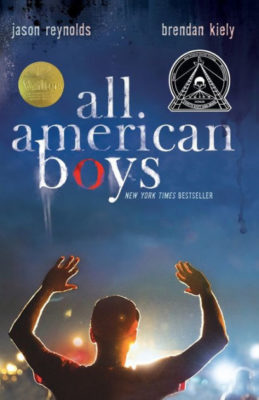Book 8: All American Boys
Schedule TBA

For Discussion:
1. As the novel opens, Rashad states, “Let me make something clear: I didn’t need ROTC. I didn’t want to be part of no military family.” Despite his lack of desire to be involved in ROTC, he remains a member in good standing to make his father happy. What can be inferred about Rashad from this knowledge? Have you ever been in a similar situation where you remained committed to something to please the people you love? If so, share your experience.
2. Rashad’s father tells him, “There’s no better opportunity for a black boy in this country than to join the army.” Based on what you learned about his father’s experiences, do you think he has a valid point?
3. Consider the cover of All American Boys. In what ways is the image symbolic for the events that transpire throughout the course of the book?
4. Describe Rashad and Quinn. What makes them dynamic characters? Are they the type of people you would want to befriend?
5. What is your earliest impression of Spoony, Rashad’s brother? Do you find him to be a good brother to Rashad? In what ways are these two brothers similar? How are they different?
6. Quinn states, “On Friday nights, there were only two things on my mind: getting the hell out of the house and finding the party.” Why do his responsibilities at home make him feel such a need to escape? How would you describe Quinn’s family? In what ways has the absence/loss of his father impacted how the family functions? Are they in any way similar to your own? If so, in what ways?
7. For what reasons do you think Quinn begins to feel connected to Jill? How would you characterize their relationship, and how does it change over the course of the novel?
8. Guzzo states, “People have it all backward. They do…I’m sorry, but my brother did the right thing. He has to make tough calls.” When his brother attacks Rashad, Guzzo is around the corner from the store, so he doesn’t bear witness to the assault. Why is Guzzo unable to come to terms with the truth about his brother’s actions?
9. Consider the variety of settings for All American Boys; name the three places you believe to be most important to the story. Using textual evidence from the book, explain why you find them to be significant to the overall story structure.
10. Jill tells Quinn, “I don’t think most people think they’re racist. But every time something like this happens, you could, like you said, say, ‘not my problem.’ You could say, ‘it’s a one-time thing.’ Every time it happened.” Do you agree with her assessment?
11. Quinn states, “And if I don’t do something. If I just stay silent, it’s just like saying it’s not my problem.” How does this moment show that Quinn is actively choosing not to be a bystander? Though difficult, do you agree it’s the right decision?
12. How does the discovery of the spray-painted tag “Rashad Is Absent Again Today” change the dynamics about how students at the high school are able to deal with the event? In what ways does this initially non-spoken symbol become an avenue for reflection and conversation among both the student body and the faculty?
13. All American Boys is told in a dual first-person narrative. How would the story be different if someone besides Rashad and Quinn were telling it? Do you think changing the point of view would make the story better or worse? If you could, would you want another character’s perspective to be included in the novel? If so, whose?
14. Dwyer tells Quinn, “Listen, man. You’ve got to fix this. We got to get the team straight…This is too big. This is our life, man. Our futures.” Consider English’s, Shannon’s, Guzzo’s, Dwyer’s, and Quinn’s shared passion for basketball. What role does the game play in the lives of these characters, and in what ways does this sport allow these young men to come together as a team? How is the team changed after the attack on Rashad? From your perspective, what will they have to do as a team to overcome this divisive experience?
15. Explain the title, All American Boys. What does it mean? In your opinion, does it accurately describe the events and relationships portrayed in the novel?
16. What is the significance of the march? Why did it mean so much to Quinn, Rashad, and Spoony? How about the rest of the characters? Why do people protest? Do you think protests are effective in voicing a cause? Can they institute change?
17. How does finding his father on the Police Plaza steps, waiting to join them on the march, affect Rashad? What makes this act such a powerful statement?
18. As the novel closes, Spoony and Berry read a roll call of real names of black people killed by police. What was your emotional response to the novel’s closing?
19. How is All American Boys a statement, or a response, to some of the racial injustice featured in the media today? What is the message that you think the authors are trying to convey through this novel? Do you think this book is an accurate reflection on society today?


